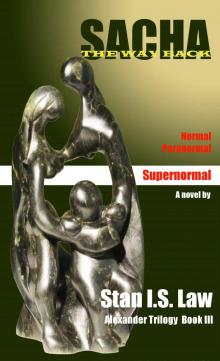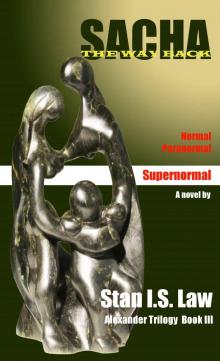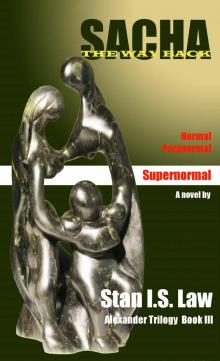- Home
- Stan I. S. Law
Alexander: [Alexander Trilogy Book Two] Page 2
Alexander: [Alexander Trilogy Book Two] Read online
Page 2
Alec Sr. dutifully agreed. Dad usually did. It was the best policy. And dad was very good at carrying out policies. He’d just retired as the Chief Engineer in charge of administration of Air Atlantic, the only real competitor of Air Canada. This involved both formulating and carrying out countless policies, as well as constant negotiations with VIPs. He still claimed it had been more exiting than living with a slide-ruler in his pants. His younger assistants had been brought up on computers. They probably had no idea what a slide-ruler was.
Alec held dad in vaguely grudging respect. His father had never struck him as an epitome of mental dexterity. He was good at his job, or had been while still working, and he made his mother happy. Slightly taller than Alec, about six-foot-two, he still presented a striking figure of robust masculinity: broad in the shoulders, still able to suck in his protesting waist, and still drawing glances from women half his age. He could hold his own in any crowd, hold up his end of any conversation, even if he lacked the deeper knowledge to venture his own opinion. People found him congenial, pleasant, a good man to have around.
Only he did look a little tired, lately.
And, to repeat, dad made Alec’s mother happy. He was the rock she could lean on in moments of stress, when the currents of life seemed to drift away from her striving grasp. As was happening now. Nevertheless, while Alicia thought that her son should get married, settle down, his father reminded her gently that had he done so himself, then he and Alicia would never have met, let alone gotten married.
“He is twenty-four, dear. At this age I was in England, trying to make up my mind what to do with my life.”
For a moment Alec Sr.’s eyes drifted, lingering on some old memories.
“Yes but... “ Her voice was almost plaintive.
“...but Alec, ah... Alexander, on the other hand, just graduated; he’s won a scholarship to Caltech. He is acclaimed the best scholar graduating this year at McGill, and he seems perfectly happy to stick with Suzy, without venturing into the playing-field, which nowadays seems replete with more ‘gentlemen’s’ diseases than was the case when I was his age.”
Alicia seemed to feel better under the onslaught of her husband’s quiet logic.
“Do let me offer you a drink, Mother,” Suzy pulled Alicia firmly towards the cocktail cabinet. “Alec, you will give me a hand?”
More often than not, Suzy addressed both women as ‘mother’, both men as ‘dad’. Somehow, she’d managed to avoid confusion.
Suzy suspected that Alicia was waiting for the opportunity to break her self-imposed fast. As for assistance, she was addressing Alec Sr. They had been on first name terms almost since they all met, that day, in Sloop Bay off Valcour Island, on Lake Champlain. Some ten years ago.
Alexander couldn’t help but smile at the ease with which Suzy killed two birds with one stone. She made both his parents happy with a single request. Being left momentarily alone, his thoughts drifted back to the matter that was beginning to prey on his mind.
Frankly, he couldn’t blame Suzy.
Living with a man who did things which, according to the sane majority, could not be done, could not be easy. At least Alec no longer drifted into his imaginary travels, a habit he had when they first met.
Yet, of late, she often seemed to feel lonely.
There was nobody with whom she could share her knowledge of Alec’s youthful exploits. Now, even in hindsight, they seemed impossible, at the very least improbable. One had to know his past to be able to understand the internal battle he was waging within himself. Battle between the world of the mind and the spirit. Or was it logic versus imagination?
“Why must these two be always at adds?” she often mused, her perennial smile losing some of its luster.
There was no one she could lean on, confide in. No one, that is, if you exclude the bifocalled staff member, a Ph.D. she’d presumed, at the friendly local psychiatric ward. She’d tried. They’d listened politely, asked her if she had any other symptoms that disturbed her, and what medication she was taking for her delusions. It had been obvious that no one had believed her. Alec was her problem and her problem alone. It wasn’t easy.
Unfortunately, Alec was very new to this shifting game. He was only just beginning to sort out what was happening. He hardly believed some of his conclusions himself. It was like flying and floating. He did it, but couldn’t quite believe it. Not in his heart. Or so it seemed. After years of nuclear physics, later particle physics in which atoms appeared like giants compared to the subatomic quarks and mesons and a host of other nuclear debris...
And yet, weren’t atoms virtually empty space? And if so, wasn’t all this taking place in his mind? In Suzy’s mind?
For the two of them, the story did not start when he began studying physics. It started a good few years earlier when he’d met his Princess. Princess Sandra.
It now seemed so very, very long ago. He missed having Sandra to ask questions. There was a time, when he thought of Sandra as his own soul. As his own inner being, incontrovertibly united with his own psyche. Not many people had a chance to meet their own inner selves. Not in ‘real’ life. The last thing he remembered was her admonition to ‘just live’.
But that was then. There was no room in his present life for souls or inner beings. Now, he was a scientist. A man guided by this mind, and mind alone. And in the realm of scientific logic there is no room for sudden, inexplicable space shifting, in gross denial of laws of nature.
Alec had opened the door before Mr. Norman pressed the bell. Suzy’s parents arrived punctually. Actually, his own mom and dad had arrived a little early. Mother probably wanted to give the apartment the once-over, before being forced to share her first impressions with anyone. It was, after all, her first visit to their new place.
John Norman embraced Alec as though he were his own son. There seemed to be a genuine friendship between the older man and Alec. Mr. Norman was a good twenty years older than Alec’s father. More like a granddad, really. A granddad Alec had never had. Suzy was the youngest of the Normans and had come fairly late in Mr. Norman’s life. Her nearest brother was sixteen years her senior.
“God, I missed you, son. It’s really good to see you.” He finally let Alec go.
“Good of you to say so, Sir.” Alec took Suzy’s father’s coat.
“John,” John Norman corrected.
“Ah, yes, sorry Sir, I mean....”
Mrs. Norman was only a little more reserved in her attitude towards Alec. She still thought Alec was too young; “She needs a strong hand, you know,” she’d told Alec on a number of occasions. “She’s our youngest, you know,” she assured him repeatedly. “One tends to spoil the youngest...”
“How is my little girl?” she asked Alec, after bending his head down to her ample bosom in a motherly embrace. “Remember what I told you about spoiling her?” She looked up at him sternly when he came up for air. She was a good eight inches shorter than Alec.
“Yes, Mrs. Norman. But I really don’t think Suzy is spoiled at all. She’s as mature and responsible as any woman her age!” Alec tried to cheer up his prospective mother-in-law, quite unaware of his qualifying statement.
“And just how many women Susan’s age have you met, young man? Well? Well?” she prompted. And as Alec stood flustered, Joan Norman burst into laughter.
“Gotcha!” she blurted and pushed past Alec into the living room.
Before joining his wife, John Norman took a step back and pressed the door chimes. He had liked the sound they made when Suzy showed him the apartment last week, on condition that he wouldn’t tell anyone.
“Do I hear wedding bells?” Alicia asked raising her glass.
This time Suzy was the only one who’d noticed. All six of them were sitting along the full length of the balcony, admiring the distant hills, now shrouded in haze, only just visible across the water. And then it happened. Alec was at the very end of the balcony, sipping his Scotch and water, and then...
Well, it was
strange to say the least.
He was telling his dad about the benefits of USLA when, in the middle of his sentence he’d changed positions: from one end of the balcony to the other. Normally such an inexplicable shift might have been ignored, but the balcony was less than five feet wide. He would have had to climb over Mr. & Mrs. Norman’s stretched out legs to get to the other side—the other end of the balcony. One instant he was talking to his dad, and the next he was smiling at Susan’s mother.
At first, seemingly, no one had noticed anything. The human mind tends to dismiss things that do not make sense. And Alec might have gotten away with it, had it not been for the plate of canapés. It left Suzy’s hands and descended by the shortest route towards his feet. He caught it just in time.
“Perhaps you will offer one to your mother?” Suzy asked sweetly. Her eyes, however, told quite a different story. As she brushed by him on her way into the living room, she whispered, “You promised you wouldn’t. Not with people around?”
Alec had never promised anything of the sort. Nor could he. Quite the contrary. He assured her, again and again, that he had absolutely no control over whatever it was that she’d noticed. Or thought she had. He’d spent countless hours trying to translate her observations into some semblance of logic, all to no avail. What Suzy described made no sense. For a moment he played with the idea of asking the others if they’d noticed something, anything peculiar taking place, but that would really make Suzy mad. And it was unwise to make Suzy mad. For whatever reason, and in front of others, family or not, it was equivalent to suicide. His––not hers. Well, practically...
Or maybe it was all Suzy. Maybe she was suffering from some sort of mental aberration that prompted her to see things that didn’t happen. Neither of the parents had said anything. But he didn’t dare suggest it to her. Anyway, what purpose would it serve?
“Won’t you have one, Mrs. Norman?” he proffered the tray.
“Can’t I have two?”
“Of course, Mrs. Norman.”
“Three...?” This time she looked closer at Alec’s eyes. “What is it, son?” There was astute concern in her eyes.
“It’s nothing,” he lied. “Really, Mrs. Norman.”
“Son!” his father called. “Why did you take away our canapés?”
Could it be that his father only now noticed his absence from his side? Perhaps Suzy was right. My God, whatever is going on? “Sandra...” he whispered. And then the moment was gone. Suzy came back with another tray while everybody was still busy doing justice to the bottle of Black Label Alec had gotten on his way back from the States. As a libertarian at heart, he considered buying off-duty liquor his patriotic duty. At the present rate, the Scotch would die a sudden death before Suzy had had a chance to serve dinner. Returning to the balcony, she looked perfectly calm and in high spirits. Alec smiled his thanks.
As it often happens at such gatherings, at any one time the three men would chat at one end of the balcony, the three women amused each other at the other. The three women in Alec’s life. Susan, with her long, blond hair, was much closer in appearance to Alicia than to her own mother. What was more, she was relatively tall, as was his mother: slim, almost statuesque, while Mrs. Norman tended towards the short and cuddly variety. Not fat, but well, perhaps just very well endowed with generous pulchritude. Suzy probably inherited the same features but they were distributed on a frame about six inches taller, which, frankly, made an enormous difference. A goddess, versus a mother goddess. His own mother also gravitated, or rose is a better word, to the first variety. Of course, Mrs. Norman had given birth to four children—Suzy had three much older brothers she hardly ever saw—while he was an only child. This could, at least in part, account for the difference in the two mothers’ proportions.
Strangely, the two mothers were about the same age, but Joan Norman had married a much older man. He’d been established by the time they’d met, while Alicia and dad had climbed the ladder together. Now his dad was also retired, but this was partly due to an inheritance he’d received from the Old Country. Apparently being an only child ran in his family, as he was the sole heir to the estate of his grandfather, who’d spent a good part of his life in India, amassing his fortune. Not a great fortune, but enough to allow dad and mom to do the travelling they’d always been drawn to. And, of course, the new boat was much bigger. From a twenty-seven-foot O’Day, dad has upgraded to a thirty-seven-footer, by the same builder. Central cockpit, a ‘real bedroom’ astern, and room enough to swing a cat. Two cats if need be. Not as agile (the boat, not the cats), nor as maneuverable, but what comfort! “If I’m in a hurry, I’ll take a jet,” dad liked to assure anyone who questioned his choice of locomotion. But he wasn’t quite fair. With a good breeze the new 37 would leave the old 27-footer well behind, and Alec Sr. liked that a lot.
Yet, the yacht was practically dad’s only folly, if such it was. In all other respects, it was almost a shame that Alec Sr. exhibited virtually no interest in money. It was necessary, it was utilitarian, it was practical. Often it was a nuisance, particularly at income tax time. Like father––like son. Alec Baldwin Jr. loved mathematics, but hated accounting.
Soon after finishing an enormous pile of steamed shrimps served with individual bawls of garlic butter and French fries— which they ate sailor-wise: with their fingers—both parental couples left. It was a long-standing custom that no dessert would be served. A small cognac with coffee, a single Belgian dark chocolate, and they were gone. Alec and Suzy cleared the dishes together and returned to the balcony. It was that time of the year when the evenings were still warm, but cool enough to cuddle up in each others arms for extra comfort. They had a hemispherical chair, resembling a satellite-dish, which only just fitted on the narrow terrace but was eminently suitable for such occasions.
“Tell me about her?” Suzy whispered, her head resting on Alec’s shoulder.
“Her?”
“Her.”
Alec knew she was talking about Sandra. There was no other ‘her’ in his life. He’d already told Suzy a little about Sandra, now and then, more as a memory of his youthful exploits than as a vibrant part of his life. Frankly, he was ready to leave that part of his life behind. As far as he was concerned, Sandra was an imaginary figment of his youth.
She no longer belonged to the scientific coordinates of his mind.
What could he tell her that she didn’t already know? Some things could not be shared. Not for unwillingness, but well, some feelings cannot be translated into words. He recalled a saying he’d once heard: the intellect calculates, the soul feels. Perhaps poets can do justice to the feelings, but Alec was a hard-nosed physicist. Or… tried to be? He may have inherited a lighter, more artistic side from his mother, but not enough to be able to speak, with facility, of the unspeakable.
“All too often, Sandra seemed well beyond words...” Alec began. He never felt comfortable talking about her. Not even with Suzy.
Suzy cuddled even closer. His eyes drifted across the expanse of the lake, and then beyond.
“My contact with Sandra, if I can be call it that, began when I was no more than fourteen. At the time, I had developed a habit of escaping into a wild, imaginary world; a world that I seem to have populated with great achievements, conquests on unprecedented scale, with heroism and daring, mostly, if not exclusively, designed to escape a reality which, at the time, I did not find particularly exciting.”
He smiled a little sadly.
“Since those days, my schooldays, I’d learned that such an imaginary world is a form of escapism not altogether unknown to child psychologists. Adults tend to compensate for their limitations, real or perceived, by realities supplied by the prodigious imagination of celebrated authors of books of fiction, by prolific screenwriters, poets and musicians. They sate their need for adventure by identifying with the bushwhacking heroes of yesteryear, by the exorbitant worlds of science fiction, by losing themselves in romance novels populated by the bold and the beaut
iful. At the bottom end of this escape funnel, the frustrated housewives turned countless innocuous starlets, propped up by aging ex-stars of afternoon soaps, into multi-millionaires.
“And you found a different way to compensate for your perceived inadequacies?” She smiled up at him. In her heart Alec had no inadequacies. Well… almost, she smiled at her own thoughts.
He ignored her interruption, but drew her even closer, planting a gentle kiss on her upturned lips.
Frankly, she was right. Any other boy with Alec’s talents and achievements would find no reason to escape reality. He might well have wallowed in his scholastic achievements, sport championships, and even a happy, close-knit family life. But Alec had not been an ordinary boy. Not by a long shot. In fact, even in his early teens he would find the word “ordinary” as distasteful as would any promising artist or musician. From as early as six or seven years of age, Alec had exhibited extraordinary characteristics, a heritage that even now he found challenging to live up to.
“The real story began when I met Sandra…”
“When you imagined you met Sandra?” she corrected.
“No, Su! When I met Sandra. She was as real to me then, as you are now.”
Then she felt his muscles relaxing again.
“I first saw her reflection in a mirror, then in a dark pane of my bedroom window. My life was never the same since. It seems that my overactive imagination took me on ever wider escapades, all seemingly propagated by my rapport with my… with my imaginary, if you insist, Princess Sandra, who seemed to appear and disappear at will, exposing me to ever wider views of the universe.” By now his voice sounded as dreamy as the stars swirling his eyes. “Together we traversed time and space as easily as closing my eyes and letting imagination take me, take us, to the very end of the rainbow.”

 Sacha- the Way Back
Sacha- the Way Back Sacha—The Way Back
Sacha—The Way Back ALEC: An Action & Adventure Fantasy Novel (Alexander Trilogy)
ALEC: An Action & Adventure Fantasy Novel (Alexander Trilogy)![Alexander: [Alexander Trilogy Book Two] Read online](http://i1.bookreadfree.com/i1/04/03/alexander_alexander_trilogy_book_two_preview.jpg) Alexander: [Alexander Trilogy Book Two]
Alexander: [Alexander Trilogy Book Two] Sacha—The Way Back (Alexander Trilogy Book III)
Sacha—The Way Back (Alexander Trilogy Book III)